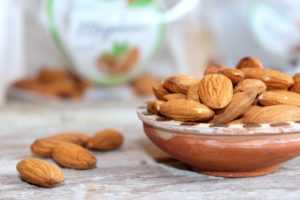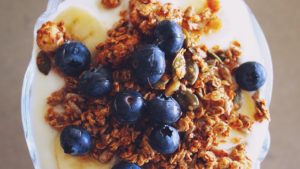Hi guys, Yossif here. Do you feel you don’t get enough protien in your diet? Do you feel like you have plateaued in your workouts? Lifting weights and cardio can help to generate new muscle but you have to have the right building blocks to properly get results! Today Casey Combs has a guest post to help us learn the best ways to increase your protein intake. Take it away, Casey!
what are some of the best ways to increase your protein intake?
A lot of people live with one very common myth in mind – that protein is only important for those trying to bulk up. You don’t have to be growing your muscles in order to focus on monitoring your protein intake. That’s because proteins are responsible for a lot of important functions in our body, such as the production of hormones, enzymes, and red blood cells, as well as growth and repair of the body’s tissues. Besides, if you increase your protein intake, you can rest assured you will be able to lose weight more easily. Just in time for summer!
Did you know that the Recommended Daily Intake for protein is as much as 50 grams? Even though some researchers firmly believe that the daily intake of protein should be much greater than this, focusing on consuming at least 50 grams per day will be enough to get you going on a good path. You are probably aware that your daily intake has to come primarily out of the foods you choose during the day. The question is how to make the right choices that will help you avoid carbs and increase your recommended protein intake? That’s what this article is for – to answer this quite perplexing question for some.
Animal proteins are the name of the game
As much as 46% of the total protein consumed in the US comes from animal sources. That’s why one of the easiest ways to increase your intake of protein is to add more foods that come from animal sources. Those include:
- Meat
- Fish
- Eggs

But be careful if you decide to use this source of protein in your favor. While meat is filled with proteins, it’s also known to contain high levels of saturated fats which are known for their ability to raise levels of bad cholesterol in the blood. In order to avoid bad cholesterol, we suggest you switch from red meat to poultry. A 100g portion of skinless roasted chicken contains 25.1 grams of protein and only 6.63 grams of fat. So gather your gym friends, pack all your kitchen supplies with ease, and prepare a portion of delicious chicken.
Eat protein before anything else
You have prepared a plate full of delicious food. Everything is looking so good that you have no idea where to start. But we do, as there’s only one right answer to that question. Start with the source of protein first! Science has shown that protein increases the production of a gut hormone that helps make you feel full and satisfied. Most importantly, protein keeps your blood sugar and insulin levels from rising after a meal, making you feel better, fuller, and healthier.
Almonds are one of the best ways to increase your protein intake

If you are looking for something that requires zero preparation and effort on your part, you really can’t do much better than almonds. Not only are they incredibly healthy and low in digestible carbs, but they also go great with different groups of foods. Chopped almonds can go over yogurt, cottage cheese, salads, and oatmeals, increasing protein intake and adding flavor to food that might be considered as bland.
So how much protein do almonds actually have? A 1-oz serving of almonds contains 6 grams of protein, making it one of the best foods for muscle recovery as proteins are known for the benefits they have on muscle growth and recovery. Should you be worried about the calories that come with almonds? Not necessarily! Studies have shown that your body won’t absorb all of those calories, although that doesn’t mean you should have three servings of almonds in a day. Modesty is the key!
Switch from traditional yogurt to Greek yogurt
Are you one of those people who love yogurt and have it with every meal? After all, that’s completely reasonable as some people have discovered a secret to easy weight loss with yogurt and kefir. In that case, all you need is a slight habit change in order to increase your daily protein intake. By switching from traditional yogurt to Greek yogurt, you would double up your protein intake. An 8-oz serving of Greek yogurt has anywhere between 17-20 grams of protein – it all depends on the brand.
Even though studies show that Greek yogurt has a plethora of health benefits, it can’t be denied that it does have a specific flavor. But that’s okay, as you can combine it with berries or chopped fruit. You can even substitute it for different dips and sauces, creating a fun new recipe that will be all your own.
Protein packed plants!
If you are a vegetarian, vegan or on a restricted diet, getting your proteins from animal sources simply isn’t an option. But nature has taken care of that, as there are many sources of protein to be found in plants. Do bear in mind that plant proteins lack the full range of essential amino acids, which is why you should combine a variety of plant proteins in order to reach your target. Wondering where to find the biggest amount of protein that doesn’t come from animal sources?

- Nuts – almonds, peanuts, hazelnuts, cashews, pistachios
- Legumes – cooked lentils, cooked soybeans, cooked kidney beans
- Chickpeas and hummus
- Oats
- Chia seeds
- Quinoa
Once you find the combination that works best for you, chances are you won’t have any trouble consuming all the protein you need.
Protein shakes are one of the easiest ways to increase your protein intake!
Do you only have 10 minutes for yourself in the morning before you have to be on the go? Then all you need is a blender, fruits, milk and a scoop of protein powder. Mix everything in a blender and voila – your protein breakfast is all set! Of course, you don’t have to drink a protein shake in the morning in order to increase your protein intake. You can take it with you to the gym and drink up right after your workout. In fact, studies have shown that consuming 20-25 grams of protein right after your workout will help you maximize muscle growth. But as long as you hit that daily mark for protein intake, you should really be satisfied. All that matters is good health, and protein will help with that.
Author Bio: Casey Combs is a certified yoga instructor with a bachelor’s degree in nutrition. Today, she works as not only a nutritionist but also as a part-time writer for different online blogs and magazines. She specializes in pregnancy yoga articles as well as clean and healthy eating.



Speak Your Mind